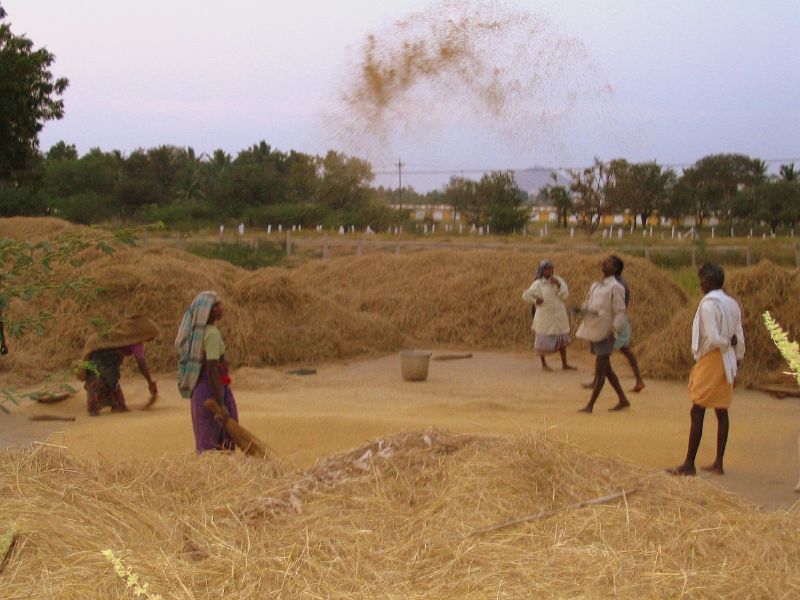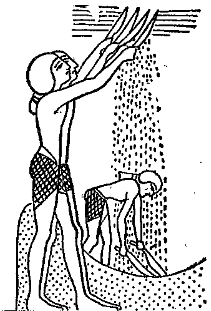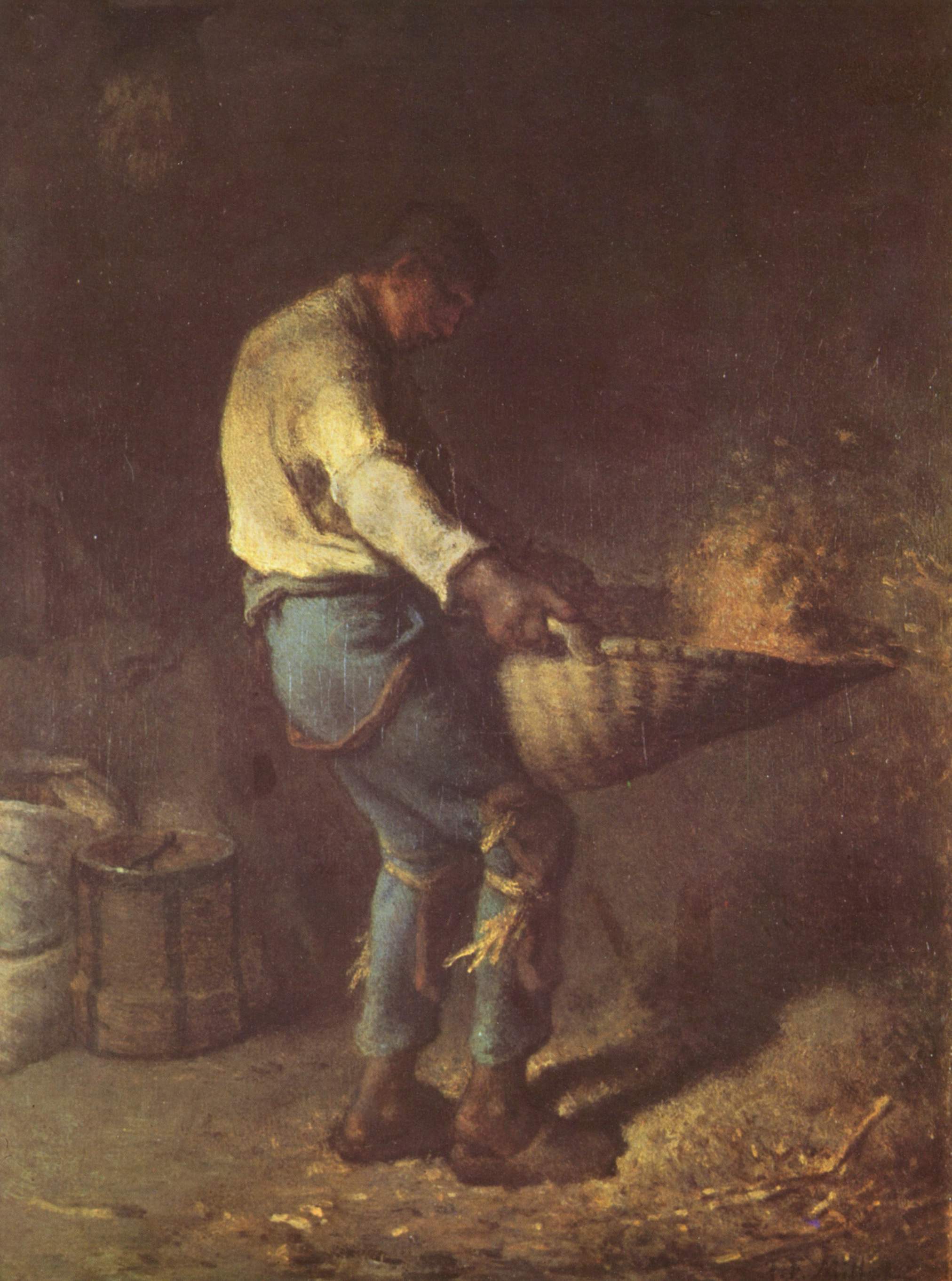Fanning Mill on:
[Wikipedia]
[Google]
[Amazon]


 Winnowing is a process by which
Winnowing is a process by which
 In ancient China, the method was improved by mechanization with the development of the rotary winnowing fan, which used a cranked fan to produce the airstream. This was featured in Wang Zhen's book the '' Nong Shu'' of 1313 AD.
In ancient China, the method was improved by mechanization with the development of the rotary winnowing fan, which used a cranked fan to produce the airstream. This was featured in Wang Zhen's book the '' Nong Shu'' of 1313 AD.
 In
In
 In 1737 Andrew Rodger, a farmer on the estate of
In 1737 Andrew Rodger, a farmer on the estate of


chaff
Chaff (; ) is the dry, scaly protective casing of the seeds of cereal grains or similar fine, dry, scaly plant material (such as scaly parts of flowers or finely chopped straw). Chaff is indigestible by humans, but livestock can eat it. In agri ...
is separated from grain
A grain is a small, hard, dry fruit (caryopsis) – with or without an attached hull layer – harvested for human or animal consumption. A grain crop is a grain-producing plant. The two main types of commercial grain crops are cereals and legum ...
. It can also be used to remove pests from stored grain. Winnowing usually follows threshing in grain preparation. In its simplest form, it involves throwing the mixture into the air so that the wind blows away the lighter chaff, while the heavier grains fall back down for recovery. Techniques included using a winnowing fan (a shaped basket shaken to raise the chaff) or using a tool (a winnowing fork or shovel) on a pile of harvested grain.
In Greek culture
The winnowing-fan (λίκνον 'líknon'' also meaning a "cradle") featured in the rites accordedDionysus
In ancient Greek religion and myth, Dionysus (; grc, Διόνυσος ) is the god of the grape-harvest, winemaking, orchards and fruit, vegetation, fertility, insanity, ritual madness, religious ecstasy, festivity, and theatre. The Romans ...
and in the Eleusinian Mysteries: "it was a simple agricultural implement taken over and mysticized by the religion of Dionysus," Jane Ellen Harrison remarked. ''Dionysus Liknites'' ("Dionysus of the winnowing fan") was wakened by the Dionysian women, in this instance called '' Thyiades'', in a cave on Parnassus high above Delphi
Delphi (; ), in legend previously called Pytho (Πυθώ), in ancient times was a sacred precinct that served as the seat of Pythia, the major oracle who was consulted about important decisions throughout the ancient classical world. The oracle ...
; the winnowing-fan links the god connected with the mystery religions to the agricultural cycle, but mortal Greek babies too were laid in a winnowing-fan. In Callimachus' ''Hymn to Zeus'', Adrasteia lays the infant Zeus in a golden ''líknon'', her goat suckles him and he is given honey. In the '' Odyssey'', the dead oracle Teiresias tells Odysseus
Odysseus ( ; grc-gre, Ὀδυσσεύς, Ὀδυσεύς, OdysseúsOdyseús, ), also known by the Latin variant Ulysses ( , ; lat, UlyssesUlixes), is a legendary Greek king of Ithaca and the hero of Homer's epic poem the ''Odyssey''. Odysse ...
to walk away from Ithaca with an oar until a wayfarer tells him it is a winnowing fan (i.e., until Odysseus has come so far from the sea that people don't recognize oars), and there to build a shrine to Poseidon.
China
 In ancient China, the method was improved by mechanization with the development of the rotary winnowing fan, which used a cranked fan to produce the airstream. This was featured in Wang Zhen's book the '' Nong Shu'' of 1313 AD.
In ancient China, the method was improved by mechanization with the development of the rotary winnowing fan, which used a cranked fan to produce the airstream. This was featured in Wang Zhen's book the '' Nong Shu'' of 1313 AD.
In Europe
 In
In Saxon
The Saxons ( la, Saxones, german: Sachsen, ang, Seaxan, osx, Sahson, nds, Sassen, nl, Saksen) were a group of Germanic
*
*
*
*
peoples whose name was given in the early Middle Ages to a large country (Old Saxony, la, Saxonia) near the Nor ...
settlements such as one identified in Northumberland as Bede
Bede ( ; ang, Bǣda , ; 672/326 May 735), also known as Saint Bede, The Venerable Bede, and Bede the Venerable ( la, Beda Venerabilis), was an English monk at the monastery of St Peter and its companion monastery of St Paul in the Kingdom o ...
's Ad Gefrin (now called Yeavering) the buildings were shown by an excavator's reconstruction to have opposed entries. In barns a draught created by the use of these opposed doorways was used in winnowing.
The technique developed by the Chinese was not adopted in Europe until the 18th century when winnowing machines used a 'sail fan'. The rotary winnowing fan was exported to Europe, brought there by Dutch sailors between 1700 and 1720. Apparently, they had obtained them from the Dutch settlement of Batavia in Java, Dutch East Indies. The Swedes imported some from south China at about the same time and Jesuits had taken several to France from China by 1720. Until the beginning of the 18th century, no rotary winnowing fans existed in the West.
In the United States
The development of the winnowing barn allowed rice plantations in South Carolina to increase their yields dramatically.Mechanization of the process
 In 1737 Andrew Rodger, a farmer on the estate of
In 1737 Andrew Rodger, a farmer on the estate of Cavers
Caving – also known as spelunking in the United States and Canada and potholing in the United Kingdom and Ireland – is the recreational pastime of exploring wild cave systems (as distinguished from show caves). In contrast, speleology is ...
in Roxburghshire
Roxburghshire or the County of Roxburgh ( gd, Siorrachd Rosbroig) is a historic county and registration county in the Southern Uplands of Scotland. It borders Dumfriesshire to the west, Selkirkshire and Midlothian to the north-west, and Berw ...
, developed a winnowing machine for corn, called a 'Fanner'. These were successful and the family sold them throughout Scotland for many years. Some Scottish Presbyterian ministers saw the fanners as sins against God, for the wind was a thing specially made by him and an artificial wind was a daring and impious attempt to usurp what belonged to God alone.Chambers, Robert (1885). ''Domestic Annals of Scotland''. Edinburgh: W & R Chambers. p. 397. As the Industrial Revolution, the winnowing process was mechanized by the invention of additional winnowing machines, such as fanning mills.
See also
* Rice huller * Rice pounder * Sieving * Threshing * Winnowing (sedimentology)References
External links
{{Wiktionary-inline, winnowing Harvest Separation processes Grain production sn:kuwurutsa ja:唐箕